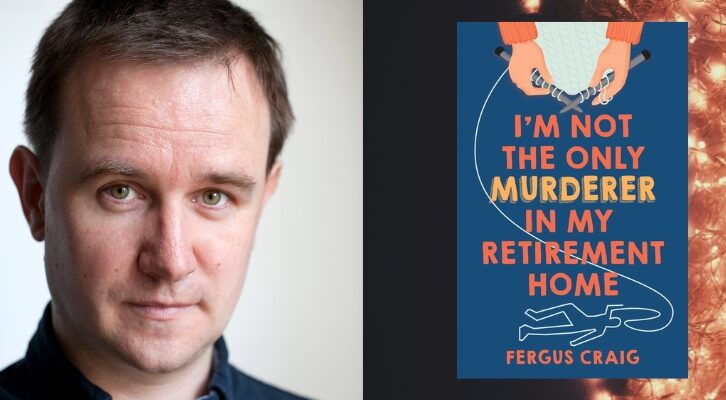
Will Anyone Read Chuck Klosterman
in 100 Years?
Even When Pop Culture Fades, Its Best Critics Don't
“Prediction is very difficult, especially if it’s about the future.”
–Niels Bohr
Here’s a prediction that’s easy for me to make: Chuck Klosterman’s new book, But What If We’re Wrong: Thinking About the Future as if It Were the Past, will be his most successful and well received since 2009’s Eating the Dinosaur.
I say “easy” because either But What If We’re Wrong will actually be critically and commercially fruitful (and I’d be correct), or it won’t (and my statement will seem less like a legitimate forecast and more an expression of my own view of the book, which really is that it’s one of Klosterman’s best). My prediction works either way.
Now here’s prophecy not easy for me to make: Chuck Klosterman’s book will be read 100 years from now. Shit, 50 years from now. The further in the future you peer the more impossible it is to anticipate what that future will look like or even what its denizens believe about the basic principles of existence, let alone what books they’re reading. Not only is the world as we know it vast and complex and rollicking and full of things we don’t know, but the future… there’s so much stuff out there on the horizon that we have no idea we don’t know.
I don’t mean to disparage Klosterman’s books, but rather to explore the topic of his newest one and apply it to his work. But, hey, just for shits and giggles, let’s let Klosterman do it himself. Here, for instance, is how Klosterman phrases the central conundrum of But What If We’re Wrong? (though the title question might just be the most succinct way of putting it) from the book’s introduction:
What about ideas that are so accepted and internalized that we’re not even in a position to question their fallibility? These are ideas so ingrained into the collective consciousness that it seems foolhardy to even wonder if they’re potentially untrue. Sometimes these seem like questions only a child would ask, since children aren’t paralyzed by the pressures of consensus and common sense. It’s a dissonance that creates the most unavoidable of intellectual paradoxes: If you ask any smart person if they believe there are major ideas currently accepted by the culture at large that will eventually be proven false, he or she will say, “Well, of course. There must be. That phenomenon has been experienced by every generation who’s ever lived, since the dawn of human history.” Yet offer that same person a laundry list of contemporary ideas that might fit that description, and he or she will be tempted to reject them all.
So although we understand the nature of human progress and the capriciousness of history, we can’t seem to imagine a future without some fundamental continuity between now and then. Klosterman shows that this cognitive gap applies to every aspect of culture, from science to TV to business, and through his wide-ranging scrutiny, he’s hit on the perfect book-length subject for his uncanny skill set.
But it got me wondering about this very thing, Klosterman’s talents, and how totally immersed in the contemporary moment, how timely, how loaded with pop culture references, and, finally, how representative of the period out of which he emerged as a voice—what fate awaits the author of books so rooted in a given era? Can the accomplishment of capturing now remain significant or noteworthy forever? Will anyone read Klosterman in the future? And if they do, how will they read him?
* * * *
Klosterman’s first book Fargo Rock City, a memoir of growing up in North Dakota as a metal fanatic, was published in 2001, but its sensibility was borne of the pop culture of the 1990s, a decade basically defined by the philosophical scrutiny of the ostensibly inert units of everyday life. In the films of Quentin Tarantino and Kevin Smith characters argue over the nuances of foot rubs, the validity of the cookie stand’s inclusion in the mall food court, the meaning of a Madonna song or the end of The Return of the Jedi—the so-called “independent” film movement was nothing more than very smart artists educated more by culture than by college. The most popular and acclaimed sitcom of the 90s was Seinfeld, a show whose claim to be about “nothing” was always understood to really be about everything, because in our culture those nothings are, or have become, everything. Novelists like Douglas Coupland and Chuck Palahniuk published their first books examining this new generation, this, as Coupland coined it, Generation X. Everywhere you looked you had art and storytelling focused on disenchanted young people forced to wonder whether the ringing of the bell would save them instead of wondering for whom it tolls.
Klosterman fits snugly into this perspective, and in fact his second book Sex, Drugs, and Cocoa Puffs may be the quintessential 90s book, even though it came out in 2003. Maybe this is because no one had dug as deeply or as hilariously as Klosterman did in that essay collection. With Tarantino and Seinfeld, et al, the whole point of their enterprise—and why they employed narrative rather than argumentation—was to have ordinary people employ pseudo-scholarly analysis to their everyday banalities, including the shows they watch, the music they listen to, and whatever else seems worthy of further mining. Klosterman, though, with nonfiction, with essays, made it official: his voice captures the qualities of an everyman while simultaneously elevating that voice to its peak academic potential. In other words, Klosterman and his books capped off the 90s by expanding its sensibility to near perfection, a paragon of casual, postmodern pop culture criticism.
When I suggested this interpretation to Klosterman during our interview, he offered an additional reason for the success of those early works:
Those things, at the time, because it was sort of pre-Internet—or, you know, the Internet existed but essentially not the way it does now—there was almost no place for those ideas to exist in the culture. And now, of course, there is limitless space for it. So, I don’t think—I mean those books could be written today, and it’s strange, they still sell so I guess someone’s interested in them. But it seems as though those two books present a period just before the Internet happened.
This certainly has the ring of truth to it, especially when you consider the sheer wealth of outlets the Internet has created and the subsequent ease of distribution that came along with it. We are now positively overflowing with cultural commentary, mostly from the average person (an inevitable fact, since, in purely statistical terms, any non-paid writer would fall into this category).
This vast proliferation of opinion has, according to Klosterman, affected not what is being written about but how:
I mean, if there were only two or three significant people writing about television, you could look at television, you could look at a show like Girls or like Mad Men and you can talk about the text, but when there’s 2,000 people doing it, it’s only subtext, because the text is too straight, too obvious, and the way to get attention is to work with the unseen sort of truth.
Again, seems like a reasonable conclusion. But I think something else happened in the post-90s, post-9/11 era. If the artists of the 90s made the study of pop culture (TV, movies, etc.) a legitimate activity, the 2000s took the notion a step further: their art would not only be aware of the commentary it would face but actually anticipate it, so that the kinds of truth deep analysis had before uncovered—i.e., the inadvertent meaning buried in cultural artifacts that probably was never intended but exists anyway—were now deliberately imbued into a work in its creation. Thus, our more recent period has taken genre seriously not just as a concept but as an art form, leading to straight-faced and more realistically oriented reboots of James Bond, Batman, and various other formerly kitschy heroes; to literary categories—YA, “chick” lit, fantasy, sci-fi, etc.—brought to new (and late-arriving) levels of respectability; to art museums featuring exhibitions of graffiti; to TV shows as complex as novels; to a culture in which the so-called canons of every art are considered suspect, deplorable, oppressive, where the only thing not taken seriously is the art made by those whose perspective allows them to treat these ideas as pure abstractions rather than social and economic impediments. In a world so rife with an infinite amount of obstacles (obstacles that, of course, stem from abstractions), simple contemplation is not enough, and in fact can seem insensitive to those who don’t have the privilege to ponder, for whom practicality necessarily outweighs deliberation.
And for Klosterman, personally, a rift has begun to form between his own views and those of the younger generation:
Now, you know, the way culture has unspooled, we’re going through this period where you’re supposed to sort of self-identify as a revolutionary progressive. Especially when I sort of look at young people’s political identity, it’s almost like they see an obligation, and if they’re in media, a careerist obligation, to take on that perception. And, um, I’m not like that.
What he is like, he says, is “fundamentally a conservative person” but that his notion of conservatism isn’t the one presented by politicians and the media during an election. “That’s the confusing thing,” he says, explaining:
I mean, who’s the most conservative candidate running for president? Clearly Hillary Clinton. The people on the Republican side are like, First day in office, I want to change the entire country! Not exactly a conservative idea. And Sanders is the same way, you know, start a revolution. But Hillary is the only candidate who I would say has any sort of relationship to conservative ideals, because she is fundamentally based in institutions, you know?
So various iterations of progressiveness and radicalness have been absorbed so fully into our culture as to almost become commonplace, even sneaking their way into a political party defined by their opposites. What does this mean, then, for Klosterman and his writing? Has the world embraced his brand of commentary, making him an early figure of its aesthetic? Or has society so readily embraced his kind of approach as to render him irrelevant, as if he’d only happened to produce his work before this boom rather than established or influenced it?
To put it more directly: when people look back on the period from the late 1990s to the early 2010s, will Klosterman’s books seem prophetic or merely co-existent? Will they appear to have helped develop an approach to pop culture, or will the future only consider the conclusions that approach engendered? Is he ahead of his time? Or just a product of it.
* * * *
Since the success of Sex, Drugs, and Cocoa Puffs, Klosterman has dabbled in other writing forms: an investigative memoir, Killing Yourself to Live; a compendium of journalistic efforts, Chuck Klosterman IV; two novels, Downtown Owl and The Visible Man; and even a set of playing cards based on Klosterman’s love of wild hypotheticals. These books expanded Klosterman’s range, both stylistically and intellectually, were mostly bestsellers, and kept Klosterman’s name in the ring of cultural criticism—but not all were acclaimed, and collectively, have they created a rich oeuvre or are they more seen as variations on the same riff?
Recall, though, that this is less a question about Klosterman’s actual development and more about the way his development has been and will be interpreted by others as history marches forward. Of course I could offer such analysis from the perspective of a critic, but part of But What If We’re Wrong?’s argument is that those kinds of critical assessments don’t play much of a role in the matter. So while I may believe that Klosterman’s writing has grown richer if not dramatically deepened my opinion is beside the point when considering the likelihood of his writing attracting a readership in perpetuity. Larger, more mysterious forces must enter into it.
With that in mind, I think it’s pretty non-controversial to suggest that if he is indeed read 100 years from now it’ll be his essays and not his fiction. In his first novel Downtown Owl, his prose style made the book feel less observational and more anthropological, which in fiction often smacks of amateurishness. His follow-up, The Visible Man, was much better, as his use of formal verisimilitude (i.e., it’s told via the notes, emails, and messages of its characters) matches his sensibility way better and its narrative conceit (in Klosterman’s words, “how it would be to be the invisible man’s therapist,” though, as he notes, there’s more to it than that) allowed for just the bemusing meditations at which Klosterman singularly excels. The reason he wrote fiction to begin with, he says, relates to how people started connecting every sentence he wrote to some essential part of the author himself, so that even if he introduced an idea just to explore it, any thought-experiments made as he did so were extrapolated to represent his worldview. But “if you create characters you can have them say those things,” he says, “That was sort of a way to kind of allow myself to write about problematic ideas without thinking, well, these will be attached to me forever.”
Klosterman, then, sometimes wants to take on a controversial subject, “an idea that you think is provocative that you only sort of half-believe,” as he puts it, but doesn’t want to risk those notions being attributed wholly to him, and fiction allows him that playground. But it seems noteworthy that one of America’s most popular essayists felt compelled to distant himself from certain opinions (or even engagement with those opinions). If the mode of the present is characterized by the democratization of opining, why would someone at the forefront of that mode want to retreat from it, if only temporarily? Does it signify a changing of the guard in which Klosterman’s writing is becoming irrelevant? Or is it merely a reflection of his own idiosyncrasies?
See, this is the problem with predicting the future: there are so many mitigating factors involved it’s impossible to hit upon the one or few that will matter on down the line. Nonetheless, Klosterman’s writing does possess one trait that may, may, allow it to persist through the decades, and it is a trait that many would say argues the exact opposite point. This trait is Klosterman’s dependency on cultural references, most of which come from the present(ish) era and many of whom have little historical staying power. But instead of rooting Klosterman’s work so deeply into the now that future readers won’t understand the context, and will thus have difficulty finding the insight of the essays—I think his books could be used representatively, a relic of early 21st-century America. Julian Barnes recently wrote in his new novel, “Art is the whisper of history heard above the noise of time.” In Klosterman’s case, he might be whispering, but it would still probably be a lengthy rant on Roseanne (especially if he’s right and Roseanne becomes the show that epitomizes TV’s Golden Age).
When I told Klosterman that he was probably the only person who could write something like But What If We’re Wrong?, by which I meant it wonderfully encapsulates his particular abilities, he said, “I don’t know if I’d say I was the only person who could write this, but because this is now my ninth book, I get that I’m probably in a position where I can at least attempt to do this. It would be a complicated thing for a first-time author to pitch.” More than a few times during our interview Klosterman turned something abstract into a practical reality, as when I said that for me criticism is just a form of autobiography, he agreed with me, but added, “But what’s interesting is that it doesn’t function like that. Like if I got, like, 25 really bad reviews for this book, I don’t think I’d be like, Oh those are 25 interesting autobiographies.”
There are ineffable concepts, ideals, and philosophical claims, and then there are practical realities—Klosterman always sees the distinction, especially in how things play out. And maybe this is the key to my inquiry into Klosterman’s readership a century from now. Maybe, yes, these thought-experiments are fun to contemplate and even more fun to write about, but maybe in the end the stark truth of daily (and weekly, and monthly, and yearly) life is of greater importance. So the final (but of course not final at all) answer is unfortunately nothing but a glorified shrug: Chuck Klosterman probably won’t be read in 100 years, but maybe that doesn’t matter at all. It doesn’t mean his books aren’t sharply observed accomplishments; it doesn’t mean his present value is diminished or erased; and it doesn’t mean that his contribution to literature and culture is rendered null and void. And perhaps the only solace available to him (but does he even care?) is that through hard work and discipline he was able to write and publish his books, ones that only he could write, and can live on what he loves, history be damned. Even still, if Klosterman continues to put out books like But What If We’re Wrong?, he’ll have a fighting chance, which is much more than most of us can say. Whatever that means I’ll leave for others to decide. Things seem to work like that anyway.
Jonathan Russell Clark
Jonathan Russell Clark is the author of Skateboard and An Oasis of Horror in a Desert of Boredom. His writing has appeared in the New York Times, L.A. Times, Boston Globe, and Esquire. He's also a columnist for Tasteful Rude.



















